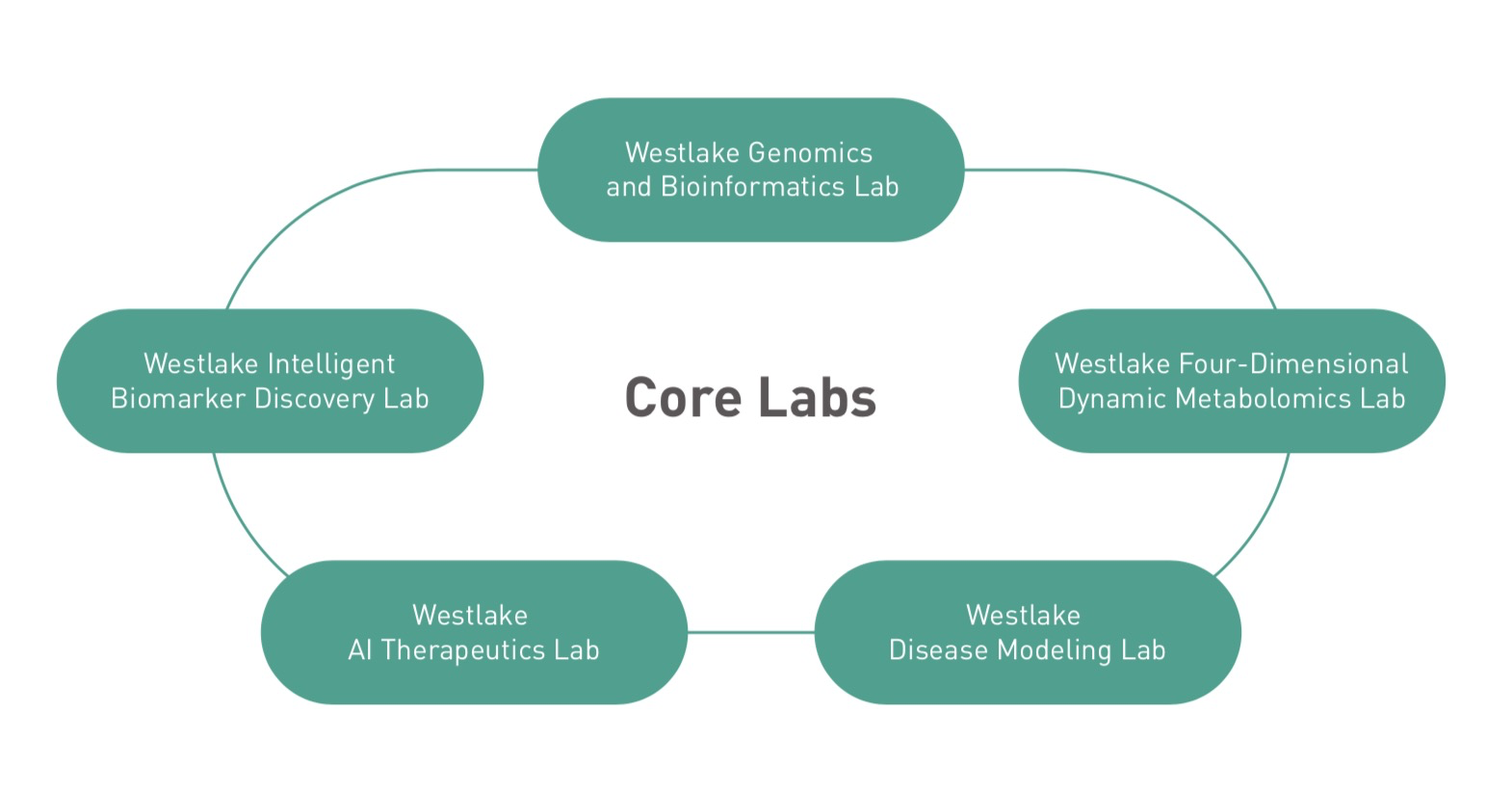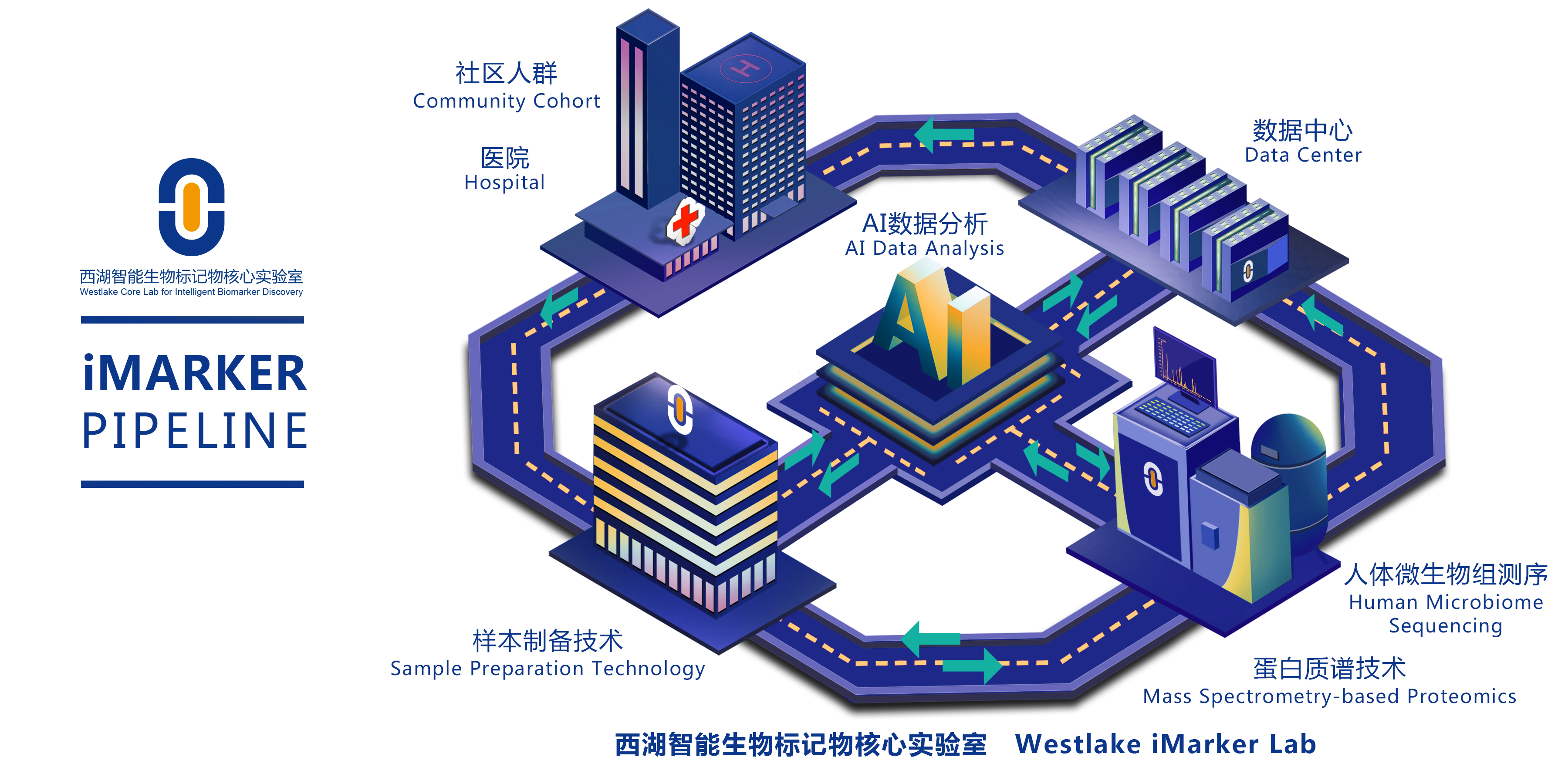- Centers and Laboratories
- Research Platforms
- Core Labs
Core Labs
Core Labs are a critical part of WLLSB and SLS, focusing on frontiers of innovative research, interdisciplinary research, and technology development. The first Core Labs include genomics and bioinformatics, artificial intelligence-derived biomarkers, multi-dimensional dynamic metabolomics, artificial intelligence drug design, and disease modeling. SLS provides the Core Labs with a full spectrum of support in recruitment, research funding, and facility development.

Westlake Genomics and Bioinformatics Lab

Genomic technologies are powerful tools to explore gene expression, diseases associated genomic variants, epigenetic regulation, chromatin conformation, genetic dependency, and many other fundamental biological questions. More recently, single cell sequencing has further improved our understanding of heterogeneous cell population and drug resistance at single cell level. The mission of this lab is to apply genomics and bioinformatics methods to advance our understanding of biology and diseases. Our lab utilizes informatics and wet lab capabilities to interrogate biology and translational medicine questions. Key efforts of this lab are to
(1) Understand molecular mechanisms of tumor initiation, relapse, and drug resistance.
(2) Identify new drug targets and biomarkers.
(3) Develop and apply novel genomic technologies and bioinformatic methods, including single cell multi-omics and novel functional genomics screening tools.
Xi Wang PhD is the director of the lab. Xi Wang obtained Bachelor of Science from Tsinghua University and PhD degree from Cornell University. Xi Wang was mentored by Scott A. Armstrong MD PhD and was trained in two top cancer research institutes - Memorial Sloan Kettering Cancer Center and Dana Farber Cancer Institute/Harvard Medical School. Her PhD thesis focused on the genetic and epigenetic regulation in cancer. Xi Wang has worked as a Computational Biologist and Senior Scientist at Agios Pharmaceuticals and Merck Research Laboratories at Boston. Her work focused on oncology drug discovery, drug mechanisms of action and biomarker identification using genomics and bioinformatics approaches.
Our lab is actively recruiting research team members. If you are interested in making an impact in biomedical research, please send your CV, personal statement, and reference letters to wangxi@westlake.edu.cn
Westlake Intelligent Biomarker Discovery Lab
Biomarkers are critical for the diagnosis and therapeutics of diseases. Effective development of biomarkers relies on multi-disciplinary research including but not limited to biology, analytical chemistry, clinical medicine, clinical pharmacology and computer sciences. The iMarker lab aims to build up such a platform promoting the discovery and validation of intelligent biomarkers. In the initiation phase, the lab will focus on multiomics analysis of specimens of clinical cohorts and epidemiological studies, building up a comprehensive molecular database, and developing customized computational algorithms for the thus generated big data. The ultimate goal is to develop and validate intelligent biomarkers for precision medicine.The core lab is co-directed by Drs. Tiannan Guo and Ju-Sheng Zheng.

Westlake Four-Dimensional Dynamic Metabolomics Lab
Metabolic reprogramming is a hallmark of many human diseases including diabetes, obesity, cancer, neurode-generation and organ damage. Decoding the metabolic alterations occurred in human diseases can not only provide novel biomarkers for disease diagnosis, but also improve our understanding about disease mechanisms and suggest novel therapeutic strategies. The Westlake Meta4D Lab aims to use various technologies including metabolomics, mass spectrometry imaging and metabolic flux analyses to characterize the metabolic basis of cancer, organ degeneration and aging. Moreover, the lab will integrate metabolic insights with other multi-omics data to establish comprehensive understanding of the molecular network driving these diseases. Research directions in the Meta4D Lab include: (1) using spatial metabolic analysis and other approaches to elucidate the metabolic changes associated with disease progression; (2) identify novel disease-associated metabolites and metabolic pathways, and characterize their structures and functions; (3) develop novel technologies that enable systematic metabolic profiling at higher spatial-temporal resolution, sensitivity, and throughput; (4) integrate metabolic profiling data with other omics data including proteomics and transcriptomics to achieve deep understanding of disease mechanisms. The Meta4D Lab is directed by Dr. Yilong Zou.
Westlake AI Therapeutics Lab
We are entering an era of artificial intelligence (AI) in therapeutics development. As the pharmaceutical industry races to employ AI to the impediments to drug discovery, tremendous progress has been made in many fundamental aspects, including molecular representation, multi-objective property optimization, chemical reaction design and molecular design, which sheds light on the bright future of AI based therapeutics development. However, many great challenges are still present, and to maximize the impact of AI, further technological advancements are still needed. The Westlake AI Therapeutics lab will focus on developing and applying cutting-edge AI technology to design both small-molecule and protein drugs in a precise and efficient fashion, by integrating multidisciplinary expertise in biophysics, biochemistry, pharmacology, applied mathematics, and computational biology. The core lab is co-directed by Dr. Jing Huang, Dr. Longxing Cao, Dr. Qi Hu, and Dr. Peilong Lu. They work closely together to use AI to drive therapeutics development and contribute to fight the emerging threats to global health.
Westlake Disease Modeling Lab
Disease models serve the fundamental research tools for investigating the genetic basis of human diseases. Their fidelity, reproducibility, and accuracy lie in the key to the correct path to uncovering the precise underlying pathobiology. Westlake Disease Modeling Laboratory (WeModel Lab), as a core division of Westlake Intelligent Biomedical Labs, strives to generate robust human disease models through cutting-edge tissue culture methods incorporated with bioengineering tools. Focusing on cancer, developmental disease, and rare genetic diseases, the lab incorporates scalable organoid, stem cell, and cancer cell culture systems to establish long-term and short-term culture of primary human patient samples for different scientific applications. WeModel Lab aims at delivering high-quality models that are comprehensively characterized using modern genomics and phenotyping tools, that can serve as starting materials for mechanism exploration of important disease areas. WeModel Lab led by the Leadership Team (Drs. Shang Cai, Qi Xie, and Xin Jin) adopts a brand new teaming format that fosters cross-disciplinary technology integration and collaborations between multiple laboratories at the Westlake University, to enable synergistic research tackling the human diseases.
